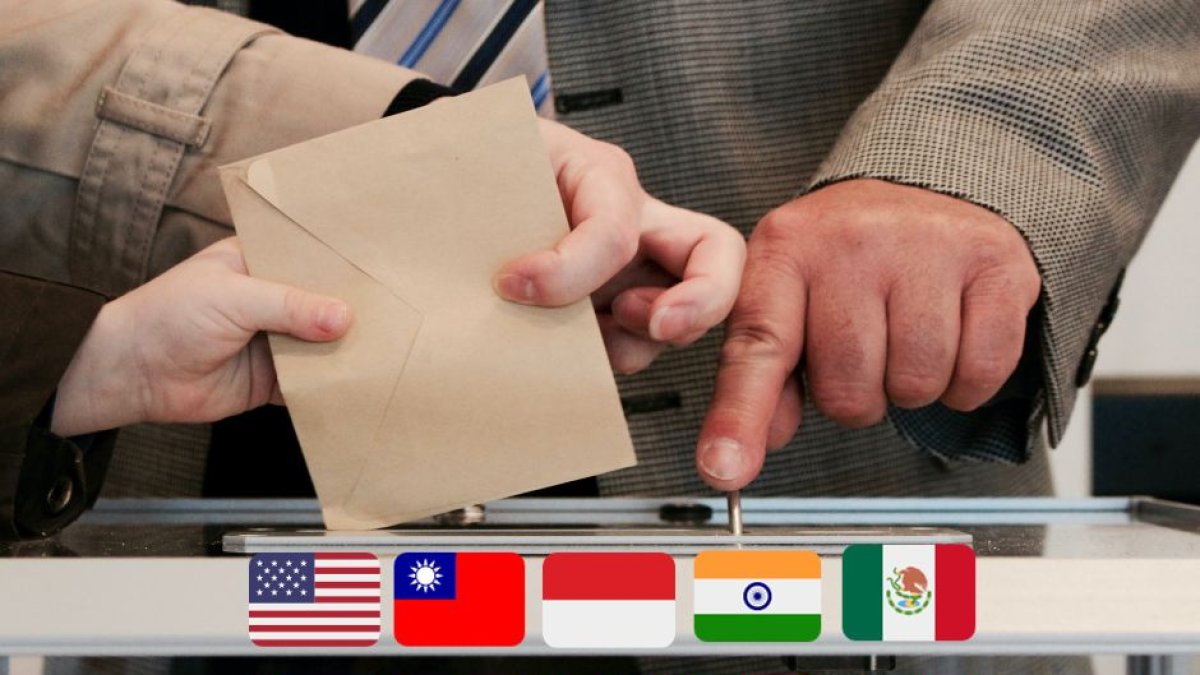Super election cycle in 2024
The United States is far from the only country facing electoral uncertainty this year. Billions of people around the world have the possibility of choosing a new leader.

Elecciones en el mundo | Unplash
More than half of the world's population will head to the polls in 2024, the most important election year in history. The United States is far from the only country facing electoral uncertainty this year. Billions of people around the world have the possibility to elect a new leader. However, in some countries the act of voting is merely a facade.
According to Our World in Data, almost half of the world's countries are electoral democracies, meaning they hold free, multiparty elections. But of those countries, just over a dozen are democracies that are more than a century old. At the beginning of the 19th century there was no electoral democracy as we know it today. Elections existed, but they were restricted in various ways. For most of history, humanity has lived under the control of some form of autocracy. The idea that we all have the right to choose our governments is very new and still quite concentrated in one sector of the world. It took centuries of civic evolution to achieve the level of democracy enjoyed by billions of people, and 2024 will test those achievements. In some cases, the results will have consequences for the country in question and for their neighbors, and in others they will have consequences for the future of the entire world.
Due to its global significance, the on Nov. 5 are the most important of the cycle. The presidential race looks like it will be a sequel to 2020, with Joe Biden facing off against Donald Trump. Whether Republicans or Democrats can advance their agenda will depend largely on what happens in Congress. Republicans have a good chance of regaining control of the Senate, and Democrats could take back the House of Representatives. November's vote may be one of the most important elections of this century.
Around the world, the first vote of the year took place in the Bangladesh general election on Jan. 7. The ruling party, the Awami League, headed Prime Minister Sheikh Hasina, was the winner of the legislative elections marked by a turnout of less than 40% due to the abstention from the opposition, which also called a 48-hour general strike and has claimed there was a state repression campaign with more than 24,000 of its leaders and followers arrested by security forces. Hasina has achieved the majority of the seats at stake and is guaranteed a fourth consecutive term. The Bangladeshi elections are proof that countries can hold elections without adopting democratic values.
The presidential elections in Taiwan will take place on Jan. 13. The current Taiwanese president, Tsai Ing-Wen, is ending her second term and cannot seek a third. The race is then between the current vice president and member of Tsai's Democratic Progressive Party (DPP), Lai Ching-te, the main opponent Hou You-ih of the Kuomintang Party (KMT) and Ko Wen-je, founder of the People's Party of Taiwan (TPP). China sees the DPP as a threat to its “One China” policy, although the DPP, like the KMT and the TPP, are not supporters of calls for a strong declaration of independence, rather they are betting on the status quo . Beijing froze relations with the DPP, and Tsai's willingness to strengthen Taiwan's military and move closer to the United States has increased tensions.
Taiwan's elections will test U.S.-China relations, and a victory for the ruling party will reheat tensions with China. The U.S. has wanted to avoid giving the impression that it is interfering with these elections. Ambassador to China Nicholas Burns said: “Our great expectation and hope is that these elections will be free of intimidation, coercion or interference from all parties. The United States is not and will not participate in these elections.”
Chinese President Xi Jinping has repeatedly expressed his desire to seize Taiwan by 2027. The two main Taiwanese parties differ sharply on relations with Beijing. Since the island's first presidential election, the DPP has emphasized Taiwan's separate national identity from China, while the KMT has sought greater accommodation with the communist giant. Foreign policy in Washington leans clearly toward the DPP, maintaining Taiwan's sovereignty is one of the few solid U.S. foreign policy priorities. Taiwan in the hands of Beijing would unbalance its military position in Asia.
Pakistan will head to the polls on Feb. 8 in a climate of high volatility. Last August, incumbent Prime Minister Shehbaz Sharif called for Parliament to be dissolved and new elections to be held within 90 days, but Pakistan's Election Commission postponed the elections, saying it needed more time to prepare, but the reason is that Pakistan has been involved in a political crisis for two years. In April 2022, the Pakistani Parliament ousted Prime Minister Imran Khan, who led protests seeking to force his successor to resign. Whoever becomes the next prime minister of Pakistan will face a critical situation internally and externally, in a country of 230 million impoverished inhabitants, which has nuclear weapons in an unstable region.
Indonesia has elections on Feb. 14. This event is a logistical feat since 275 million inhabitants spread across thousands of islands will have to vote in a single day. Current President Joko Widodo (Jokowi) cannot run for a third term, and the three main candidates to replace him are Ganjar Pranowo, Anies Baswedan and Prabowo Subianto (the favorite), who was banned from entering the United States for two decades due to violations of human rights. Ganjar has a degree in political science from Northern Illinois University, became president of an Islamic university and is popular among Islamist groups.
India will have national elections in April-May 2024, electing members of the 18th Lok Sabha, or national Parliament. The party or coalition that controls the Lok Sabha will select the prime minister. There is a good chance that ruling Narendra Modi and his Bharatiya Janata Party (BJP) will win their third consecutive election and avoid having to rely on a coalition to govern. Modi has high percentages of support, with India's economy growing steadily.
Mexico will vote for president on June 2. The Constitution prohibits the current president Andrés Manuel López Obrador (AMLO) from seeking re-election, but he has a good image and his party, Morena, will present Claudia Sheinbaum as a candidate. She is the former mayor of Mexico City and an AMLO ally who has promised to continue AMLO's policies. Mexico's main opposition parties have united in the Broad Front for Mexico (FAM) which presents Xochitl Gálvez as its candidate.
There are also elections in Belgium on June 9. It is the country that has the record of going the longest without forming a government. Belgians will elect members of their regional, federal and European parliaments. The right leads the polls in Flanders.
The date of South Africa's general election, which will be held under new rules allowing independent candidates to run for public office, is yet to be determined. South African President Cyril Ramaphosa, accused of corruption, will likely seek a second term. The Democratic Alliance, South Africa's largest opposition party, hopes to seize power in coalition with other opposition parties, which seems to be a long shot.
There are also elections in the European Parliament from June 6 to 9. This parliament exercises the power to determine the election of the president of the European Commission. More than 400 million European member states will select 720 parliamentarians to serve from 2024 to 2029.
The electoral dates in the U.K. are uncertain, where the ruling party has very low popularity. The government could postpone the elections until January 2025, but the probable date is in the last quarter of 2024.
The presidential elections in Russia that will take place from March 15 to 17, those of the Islamic Consultative Assembly in Iran on March 1, and the one in Ukraine scheduled for March and suspended by Martial Law, do not present major uncertainties. Neither does the presidential election of Venezuela, scheduled for December, nor that of the Supreme People's Assembly of North Korea on April 10.
Also on the extensive list of elections are Algeria and Ghana on Dec. 7; Mali, Sri Lanka, Romania, Chad and Senegal on Feb. 25; Rwanda on July 15; Tunisia and the Dominican Republic on May 19; and Sudan to renew its president. There are also elections in Azerbaijan on Feb. 7; El Salvador on Feb. 4; Slovakia and Finland on Jan. 28; Mauritania on June 22; Panama on May 5, Croatia and Georgia on Oct. 26; Uruguay on Oct, 27; Moldova and Lithuania on May 12; and Palau, Namibia, Guinea Bissau, North Macedonia and Comoros on Jan. 14. There will also be parliamentary and regional elections in the Syrian Arab Republic, South Korea, Uzbekistan, Madagascar, Cambodia, Portugal, Belarus, Austria, Mongolia, Botswana, Solomon Islands and Tuvalu on Jan. 26.
Key political successions are taking place all over the planet with the gloomy panorama of systematic economic crises and ongoing wars added to growing or latent war tensions. In this context, this mega election year takes on enormous importance.

























